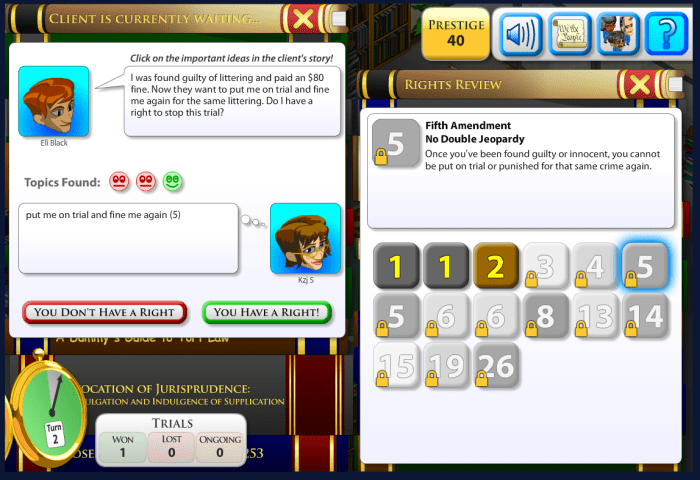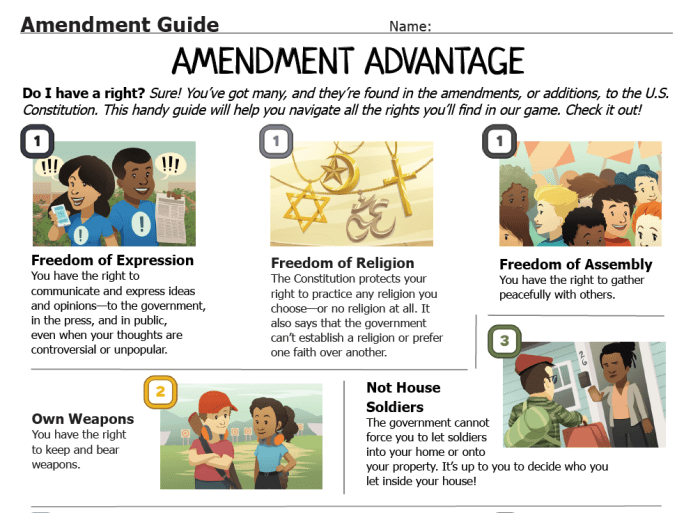Do i have a right icivics answer key – Embark on a journey to unravel the intricacies of your fundamental rights with the iCivics “Do I Have a Right?” quiz answer key. This comprehensive guide delves into the legal landscape, empowering you to navigate the complexities of individual rights and responsibilities.
Through a meticulous examination of key legal concepts, types of rights, and the role of the courts, this answer key unlocks a deeper understanding of the Bill of Rights and its profound impact on your daily life.
Overview of iCivics “Do I Have a Right?” Quiz

The iCivics “Do I Have a Right?” quiz is an interactive online assessment that tests students’ knowledge of their individual rights and responsibilities under the U.S. Constitution. The quiz is designed for middle and high school students and is aligned with national civics standards.
Key Concepts Covered in the Quiz

- The Bill of Rights
- Civil rights
- Constitutional rights
- Legal protections
- Individual rights and responsibilities
These concepts are essential for understanding the foundation of American democracy and the role of citizens in a free and just society.
Types of Rights and Protections Explored
The quiz covers a wide range of rights and protections, including:
- Freedom of speech
- Freedom of religion
- Right to bear arms
- Right to a fair trial
- Right to privacy
- Equal protection under the law
li>Right to due process of law
These rights are guaranteed by the Constitution and are essential for protecting individual liberty and ensuring a just and equitable society.
Understanding the Bill of Rights

The Bill of Rights is the first ten amendments to the U.S. Constitution. These amendments were adopted in 1791 and guarantee certain individual rights and freedoms. The quiz focuses on several key amendments, including:
- First Amendment: Freedom of speech, religion, and the press
- Fourth Amendment: Protection against unreasonable searches and seizures
- Fifth Amendment: Right to due process of law and protection against self-incrimination
- Sixth Amendment: Right to a fair trial
- Eighth Amendment: Prohibition of cruel and unusual punishment
Understanding the Bill of Rights is crucial for comprehending the foundation of American democracy and the rights of citizens.
Role of the Courts in Upholding Rights
The courts play a vital role in interpreting and enforcing individual rights. The quiz highlights the importance of the judicial branch in protecting citizens from government overreach and ensuring that their rights are respected.
The quiz also discusses landmark court cases that have shaped the understanding of individual rights, such as Marbury v. Madison, Brown v. Board of Education, and Roe v. Wade. These cases have established important precedents that continue to guide the interpretation of the Constitution and the protection of individual rights.
Limitations and Exceptions to Rights
While the Constitution guarantees certain individual rights, there are some limitations and exceptions to these rights. The quiz explores these limitations, such as:
- Time, place, and manner restrictions on speech
- Exceptions to the right to bear arms
- Balancing individual rights with public safety
- The government’s interest in national security
Understanding these limitations is essential for a comprehensive understanding of individual rights and the complex relationship between individual liberty and the common good.
Real-World Applications and Examples

The quiz emphasizes the practical application of individual rights in everyday life. It provides real-world examples of how the concepts covered in the quiz relate to actual situations and events.
For instance, the quiz discusses the right to free speech in the context of social media platforms and the right to privacy in the context of government surveillance. These examples help students connect the abstract concepts of individual rights to tangible and relatable situations.
Detailed FAQs: Do I Have A Right Icivics Answer Key
What is the purpose of the iCivics “Do I Have a Right?” quiz?
The quiz aims to educate individuals about their fundamental rights and responsibilities under the U.S. Constitution.
What key legal concepts are covered in the quiz?
The quiz addresses concepts such as due process, equal protection, freedom of speech, and the right to privacy.
How does the quiz relate to real-world scenarios?
The quiz provides practical examples of how legal principles apply in everyday situations, empowering individuals to understand and assert their rights.